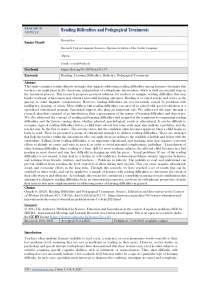Reading Difficulties and Pedagogical Treatments
Автор: Ouazib S.
Журнал: Science, Education and Innovations in the Context of Modern Problems @imcra
Статья в выпуске: 7 vol.8, 2025 года.
Бесплатный доступ
This study examines certain didactic strategies that support addressing reading difficulties among learners—strategies that teachers can implement in the classroom, independent of orthophonic intervention, which is itself an essential stage in the treatment process. This research proposes practical solutions for teachers to mitigate reading difficulties that may hinder academic achievement and obstruct successful learning outcomes. Reading is a central activity and serves as the gateway to other linguistic competencies; However, reading difficulties are not necessarily caused by problems with intelligence, hearing, or vision. Most children with reading difficulties can succeed in school with special education or a specialized educational program. Emotional support also plays an important role. We addressed this topic through a research plan that consisted of an introduction, then a presentation of the nature of learning difficulties and their types. We also addressed the concept of reading and learning difficulties and stopped at the symptoms accompanying reading difficulties and the factors causing them, whether physical, psychological, social or educational, It can be difficult to recognize signs of reading difficulties before a child starts school, but some early signs may indicate a problem, and the teacher may be the first to notice. The severity varies, but the condition often becomes apparent when a child begins to learn to read. Then we presented a group of educational strategies to address reading difficulties. These are strategies that help the teacher within the department, who can apply them according to the available schedule and in line with the curriculum. Talking about reading difficulties, is an important educational, and teaching, issue that requires concerted efforts to identify its causes and ways to treat it, in order to avoid potential complications, including: - Exacerbation of other learning difficulties, Since reading is a basic skill for most academic subjects, the affected child becomes in a bad position in most classes and may face difficulty in keeping up with his peers. - Social problems. If one of the reading difficulties is not treated, it may lead to a decline in self-confidence, behavioral problems, anxiety, aggressive behavior, and isolation from friends, relatives, and teachers. - Problems in puberty. The inability to read and understand can prevent children from reaching the level expected of them during their growth. This can cause negative educational, social, and economic effects in the long term. Through this research, we have reached a set of results that can be enriched in other works, and can be applied to a sample of learners with reading difficulties, to determine the extent of their effectiveness and efficiency. Accordingly, this research is considered a contribution among several contributions that attempted to diagnose reading difficulties from an educational perspective, not from an orthophonic perspective, despite their intersection and complementarity in addressing issues of learning difficulties in general.
Reading, Learning Difficulties, Didactics, Pedagogical Treatments
Короткий адрес: https://sciup.org/16010898
IDR: 16010898 | DOI: 10.56334/sei/8.5.77


